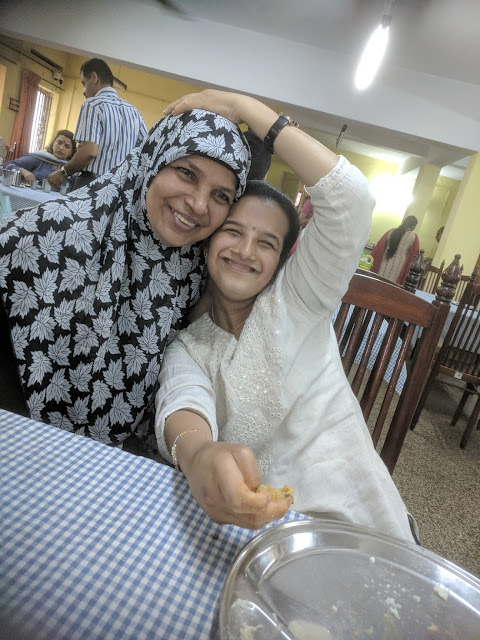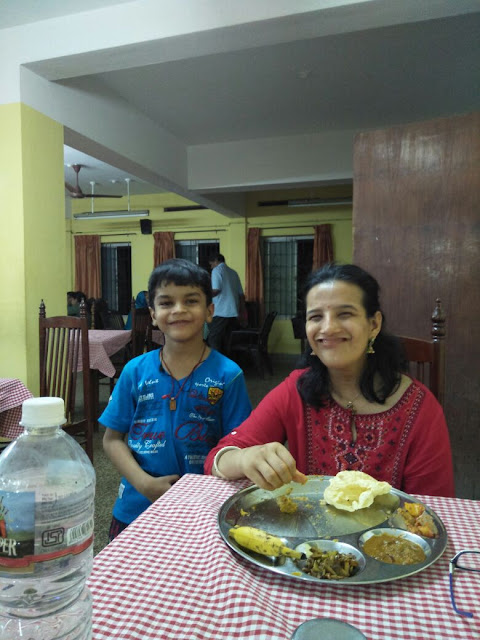Changes are always difficult to face and manage. Changes can be extremely stressful for children with Autism Spectrum Disorder (ASD). This post is about the way our daughter Pratibha responded to a major change at home.
All of a sudden, we decided that my wife be in my son’s place for about 5 months. When the pillar of 'the home' moves out for a while, a huge vacuum is created, and each member responds differently. We knew that the impact of that decision in our daily life is going to be huge. Daily routines of everyone at home is going to change, and not sure of the Impact on our daughter Pratibha. This is the first time she is going to live with mother away for this long. Pratibha needs mother for anything and everything. So, was a bit worried on how are we going to manage this. As both me and Pratibha has passion for cooking and household tasks, I thought we will together get into managing the affairs of the house.
The very first day morning Pratibha asked me what all we need to cook for the day. First thing in the morning, we together decide the menu for breakfast, lunch and dinner. For last few years Pratibha used to make tea for all of us and then leave the kitchen to her mother for the rest of the day; of course, barges into the kitchen again to make evening tea. Now she “took charge” of the house, as “woman of the house”, and proactively started getting into the chores right away, without compromising on her daily activities such as practicing Sitar, solving puzzles (word hunting and sudoku) from news paper, and helping grandfather in daily puja morning and evening.
As she kept forgetting the menu we decided in the morning, she started writing down the menu. Here’s a typical menu she wrote.
Both me and my wife are not that organised in these matters. Pratibha always tries to be organised. Whenever she goes for shopping with me or my wife, she always make sure that she makes a list, resulting in no misses. On the contrary, I always use to forget one or two items in every shopping. After couple of days, she went one step ahead and started making todo list for the whole day. Every day after dinner she sits with me and makes todo list for the next day. Here’s a typical todo list she made.
As far as cooking is concerned, she completes cooking of the lunch, that include rice, a dal / sambar and a vegetable Subji in the morning itself and gets idli into the steamer, all in about an hours time. Also will prepare sambar or chutney to be used as a side dish for breakfast. My sister ensures that we have enough batter for dosa / idli in our fridge.
One difficulty is, once a routine is set, she will stick to it, and almost impossible to change it.. Typical of Autism!
Our fear on how she will manage with ‘mother being away’ became completely misplaced… She kept telling “I miss Amma” few times a day. But she ensured that, the feeling did not come in her way of running the house. Whenever she gets into the feeling of ‘missing Amma’, I observed Pratibha speaking to herself to get back on track. She used to tell herself “I am big. I have to take care grand parents and father”. She would tell this few times to herself, possibly to get rid of the ‘missing’ feeling and gain strength. A big lesson for us to learn.
When she completes her work in Arpan and starts back, she calls me to check the status of things at home; whether grand parents had lunch properly, whether the maid came and did her job well, and what all we need to buy in our evening shopping etc. etc. She want to be on top of everything!
Different activities that Pratibha does every day is captured in few picture collages. Here they are:
Some of the biggest worries of parents of children with intellectual disabilities such as Autism, Down Syndrome and MR are: ‘Can our child become independent?’, ‘Can our child acquire basic skills required for living?’, ‘How will the child manage after us?’.. In order to achieve all these, the children have to acquire the basic living skills, be functionally independent as much as possible, and get integrated into the society. It's not that easy. By looking at the way Pratibha is conducting herself and managing the 'big change', we not only feel confident, but also feel very proud of her.
Yes, we have come a long way. From almost a non-verbal state 20 years back, Pratibha transformed into fairly independent today with high social interaction, sense of responsibility and urge to achieve.
I am sure the training that Pratibha received at Arpan is immensely helping her in her present day to day tasks.
We feel, Pratibha took the 'change' as an 'opportunity' and managing it exceptionally well. When the neuro-typical ones tend to find excuses and generally try to evade changes, very happy to see the 'special' one taking the change head-on, and managing it very well. What else the parents need!
We should respect and accept their ('special' persons') views and ways of doing, if it is not harming anyone. They are capable of doing many things; let them do with patience and love, in their own way. We need to appreciate them for everything. With that, we are sure, they will bloom and prepare themselves to be included in the society. That is the lesson we learned from Pratibha.




















































